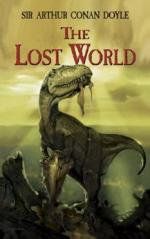“By all means. Let our young friend give it a name,” said Challenger.
“Then,” said I, blushing, I dare say, as I said it, “let it be named Lake Gladys.”
“Don’t you think the Central Lake would be more descriptive?” remarked Summerlee.
“I should prefer Lake Gladys.”
Challenger looked at me sympathetically, and shook his great head in mock disapproval. “Boys will be boys,” said he. “Lake Gladys let it be.”
CHAPTER XII
“It was Dreadful in the Forest”
I have said—or perhaps I have not said, for my memory plays me sad tricks these days—that I glowed with pride when three such men as my comrades thanked me for having saved, or at least greatly helped, the situation. As the youngster of the party, not merely in years, but in experience, character, knowledge, and all that goes to make a man, I had been overshadowed from the first. And now I was coming into my own. I warmed at the thought. Alas! for the pride which goes before a fall! That little glow of self-satisfaction, that added measure of self-confidence, were to lead me on that very night to the most dreadful experience of my life, ending with a shock which turns my heart sick when I think of it.
It came about in this way. I had been unduly excited by the adventure of the tree, and sleep seemed to be impossible. Summerlee was on guard, sitting hunched over our small fire, a quaint, angular figure, his rifle across his knees and his pointed, goat-like beard wagging with each weary nod of his head. Lord John lay silent, wrapped in the South American poncho which he wore, while Challenger snored with a roll and rattle which reverberated through the woods. The full moon was shining brightly, and the air was crisply cold. What a night for a walk! And then suddenly came the thought, “Why not?” Suppose I stole softly away, suppose I made my way down to the central lake, suppose I was back at breakfast with some record of the place— would I not in that case be thought an even more worthy associate? Then, if Summerlee carried the day and some means of escape were found, we should return to London with first-hand knowledge of the central mystery of the plateau, to which I alone, of all men, would have penetrated. I thought of Gladys, with her “There are heroisms all round us.” I seemed to hear her voice as she said it. I thought also of McArdle. What a three column article for the paper! What a foundation for a career! A correspondentship in the next great war might be within my reach. I clutched at a gun—my pockets were full of cartridges—and, parting the thorn bushes at the gate of our zareba, quickly slipped out. My last glance showed me the unconscious Summerlee, most futile of sentinels, still nodding away like a queer mechanical toy in front of the smouldering fire.




